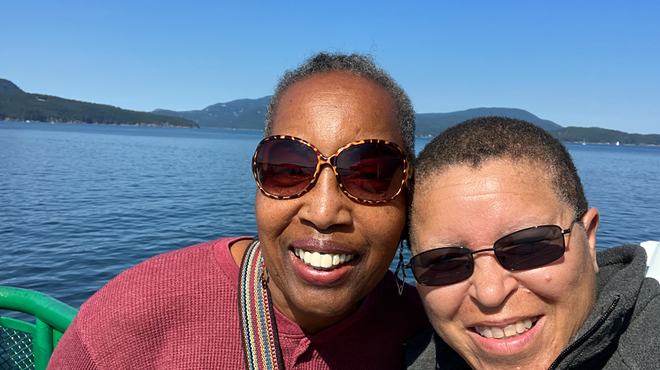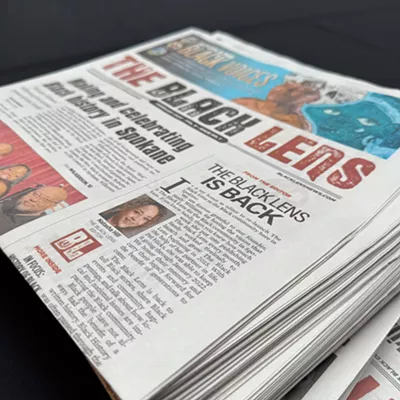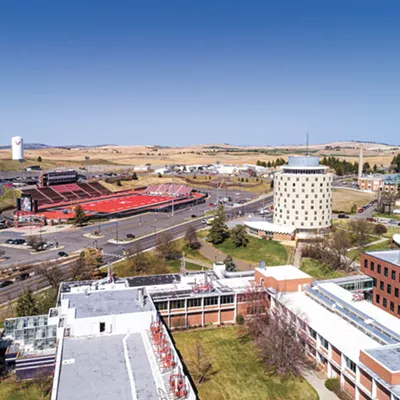As much as Sandy Williams wanted not to be in the spotlight, she was moved to improve things for communities historically mistreated and ignored.
Williams, who died in a plane crash in Puget Sound last week along with her partner, Patricia Hicks, and eight other people, would likely have been embarrassed by the recent outpouring of community support and attention, says her brother, Rick Williams.
"She would have hated this, but she earned it," Rick says, noting that his family is introverted, even though all worked in advocacy. "What's really touched me is not so much [hearing about] the amazing deeds — those are outstanding — but it's the way she made people feel. What we are getting most is that Sandy touched them, they felt heard."
From working with LGBTQ communities to tackling mistreatment of communities of color, Williams' quiet leadership had ripple effects throughout the Inland Northwest. Williams worked tirelessly, facing challenges as she started the Black Lens newspaper and founded the Carl Maxey Center.
She often contacted those she thought could take up the fight. From meeting regularly for one-on-one lunches with Pastor Walter Kendricks of Morning Star Baptist Church — "She'd say, 'Let's get together for yummies,'" Kendricks says — to mentoring people interested in holding police accountable or writing columns for her paper, Williams impressed upon many her ability to hear them.
A celebration of life was held Tuesday, Sept. 13, which would have been Williams' 61st birthday, and the family hopes to have a more formal funeral or memorial at a later date.
"I think as sad as her passing is, it has really been a catalyst and a call for people who were just begging her to do that work," says Spokane City Council member Betsy Wilkerson. "Sandy's legacy is secure. I've been challenging other people: What will your legacy be?"
S.C.A.R. AND THE CARL MAXEY CENTER
Kendricks says he truly thought of Williams as a sister. They were that close.
Williams reached out to Kendricks shortly after he became the pastor at Morning Star in late 2013.
"She really believed the backbone of the Black community is the Black church," Kendricks says. "We supported her without a doubt. When nobody else was there with her, Morning Star was there with her."
"Sandy's legacy is secure. I've been challenging other people: What will your legacy be?"
They talked about fighting discrimination, but they also spoke of their relationships, church and building community. After Williams learned Kendricks likes to cook, he says they started meeting at his house so she could request things like a custom omelet, or he'd offer to grill steaks.
"I went to see the family [last week] and her brother Rick, he looked at me and he said, 'You know Sandy loved you, right?'" Kendricks says. "I said, 'Yeah man, I know. I loved her too.'"
The two helped found Spokane Community Against Racism (S.C.A.R.) days after a White man was found not guilty in 2017 in the death of a Black man he'd shot in the back in East Central after witnessing a fight between the man and a woman.
"We called a community meeting at Morning Star I think on a Saturday after that verdict came back," Kendricks recalls. "She came up with that name of S.C.A.R. That church was packed, there must've been 150 people."
After passing the hat to raise money, they founded the watchdog organization, which focuses on anti-discrimination and anti-racism efforts.
Around the same time, Williams had started meeting with Kendricks and others in the Black community to talk about a bold idea she had to start a community resource center.
Councilwoman Wilkerson had known Williams for more than three decades before the two started working closely on Williams' dream for the Carl Maxey Center, where Wilkerson is now president of the board. Often, she says, they connected as the only Black women in rooms full of White people, supporting each other through difficult interactions.
Williams pitched opening the center in East Central. When they started asking for financial support, the conversations between the "new kid" nonprofit and funders weren't always easy, Wilkerson says.
"We're only 3 years old," Wilkerson says of the center, which opened its doors to the public in February after working remotely to help Black businesses and renters access pandemic assistance. "It was challenging trying to get people to understand that we were not being racist 'cause we were trying to help the Black community — that made people uncomfortable."
The two fought not only to get people to understand that investing in the African-American community is an investment in Spokane as a whole, but also to understand that more resources are needed. Wilkerson says some funders were hesitant, saying, "Well, you have the MLK Center, isn't that enough?" to which she and Williams responded, "We can only have one? Is that what you're saying?"
The MLK Center largely provides resources for early childhood populations and seniors.
"[At the Maxey Center] we're talking about the high school kids, we're talking about parenting classes, we're talking about higher education, criminal justice and other programs that complement the work of the MLK Center," Wilkerson says.
In addition to working on police accountability, discrimination in schools and expanding resources, Williams also worked to ensure the Black community wouldn't be further disenfranchised by construction of the North Spokane Corridor freeway, which could've cut off one of the main access points to East Central, Wilkerson says.
"For so long, the Black community had been quiet and just accepted what was given to us, unlike other communities or neighborhoods that would show up en masse complaining," Wilkerson says. "We didn't have that, so Sandy filled that void."
Williams tried to help other people realize their dreams, Wilkerson says, and the Maxey Center will continue that work. People can get legal help, access meeting space and, importantly, work with other people of color, she says.
THE BLACK LENS
Williams started the Black Lens in 2015 after seeing a gap in local media coverage of the Black community. The paper, virtually a one-woman production as Williams wrote, edited, sold ads and distributed all the copies, was a passion project.
Kiantha Duncan, president of Spokane's chapter of the NAACP, says she and Williams became closer as she wrote multiple columns for the paper. But she also got to know Williams better as she, Duncan and Duncan's partner were three of the only openly gay Black women in Spokane when they met.
"Our initial connections were not because of what was happening in the city," Duncan says. "We were two Black lesbians, which in Spokane, we don't have a big pool. ... We tried to be a community for each other."
The two first met when Duncan and her partner, Sylvia Brown, brought The Williams Brothers gospel group to town in 2017. The couple hosted a private show at their home, and Duncan recalls that Williams walked in the door with a huge smile on her face.
"She would smile big, but her words were very soft. She was an introvert. People would find that hard to believe, but she was," Duncan says. "Towards the end of the night, Sandy said to me, 'Would you like to write for the Black Lens?' and I said, 'That's a bucket list item.'"
Williams had put production of the paper on a one-year hiatus in February 2022, because she wanted to give the Maxey Center the attention it deserved as it opened. But even as Williams and Hicks went on vacation to the San Juan Islands, where they boarded the seaplane that ultimately took their lives, Williams had already been thinking ahead to the next issue of the paper scheduled for February.
"The work she did primarily through the Black Lens was to help provide education for people who weren't Black as well. You don't try to do that unless you care," Duncan says. "Sandy was actually doing things for the community at large. If you educate people, that's how things change."
More than just feeling devastation over the loss, Duncan says she's been thinking about what she needs to do next.
"What is my responsibility in carrying on my friend's legacy? What is my responsibility in the advocacy work that she did?" Duncan asks. "It's very important to us that the Black Lens comes alive again."
FROM ACTIVISM TO EQUESTRIANISM
More than just remembering her advocacy for the voiceless, Williams' close friends and family want people to take up the torch to make Spokane better. And they want people to remember the personal connections she made with so many.
Over the last two years, Williams had finally started to do some of the things she'd always wanted to do, her brother says.
"Activism is great, but what I was really proud of in the last couple years was that she also decided that it was time to take care of herself," her brother, Rick, says. "She started doing some amazing things."
Williams learned how to ride a horse, visited Alaska and even went skydiving on her 60th birthday with her daughter, Renika, Rick says. She did all that between making time to care for her mother, Wilhelmenia Williams, who she lived with and took to countless community events.
"She started checking things off a mental checklist," he says. "It was all part of this journey she was on."
Hicks played an important role in that, pushing Williams to be more adventurous and make time for fun, rather than working 24/7. Hicks and Williams had dated previously when they lived in California. After drifting apart, they reconnected before the pandemic, and Hicks moved to Spokane. The retired teacher supported Williams' work at the Maxey Center, leading Alcoholics Anonymous meetings.
"Sandy was a curmudgeon," Wilkerson says. "But Patricia brought out the side of Sandy that was hidden."
Rick hopes people realize how multidimensional his sister was.
"She was an amazing daughter, sister, community activist, she was an amazing partner and friend with Patricia, and she was an amazing mother," Rick says. "How she found time to talk to her daughter every morning, spend time with our mother, and be down at the Carl Maxey Center, it's phenomenal to me."
He thinks that even people who weren't always happy to see her walk into a room understood that her passion was speaking on behalf of others who didn't have anyone looking out for them.
"Her focus was on how do we bring light, economic opportunity and potential to the Black community?" Rick says. "By working with everybody, uniting communities and asking, 'How do we be better people to each other?'"
Kurtis Robinson, who worked on police reform and other issues with Williams, says he admired watching her calculate what she said, how she said it, when she said it, and who she said it to.
"One of the things she was really meaningful about was making sure that it wasn't just about her continuing the push, but lighting the fires under others," Robinson says. "When I think about Sandy, that's what I hope people remember: not only what she did, but the drive and encouragement for other people to not just stay on the sidelines, but to actually get to work and do something meaningful about these issues." ♦




























